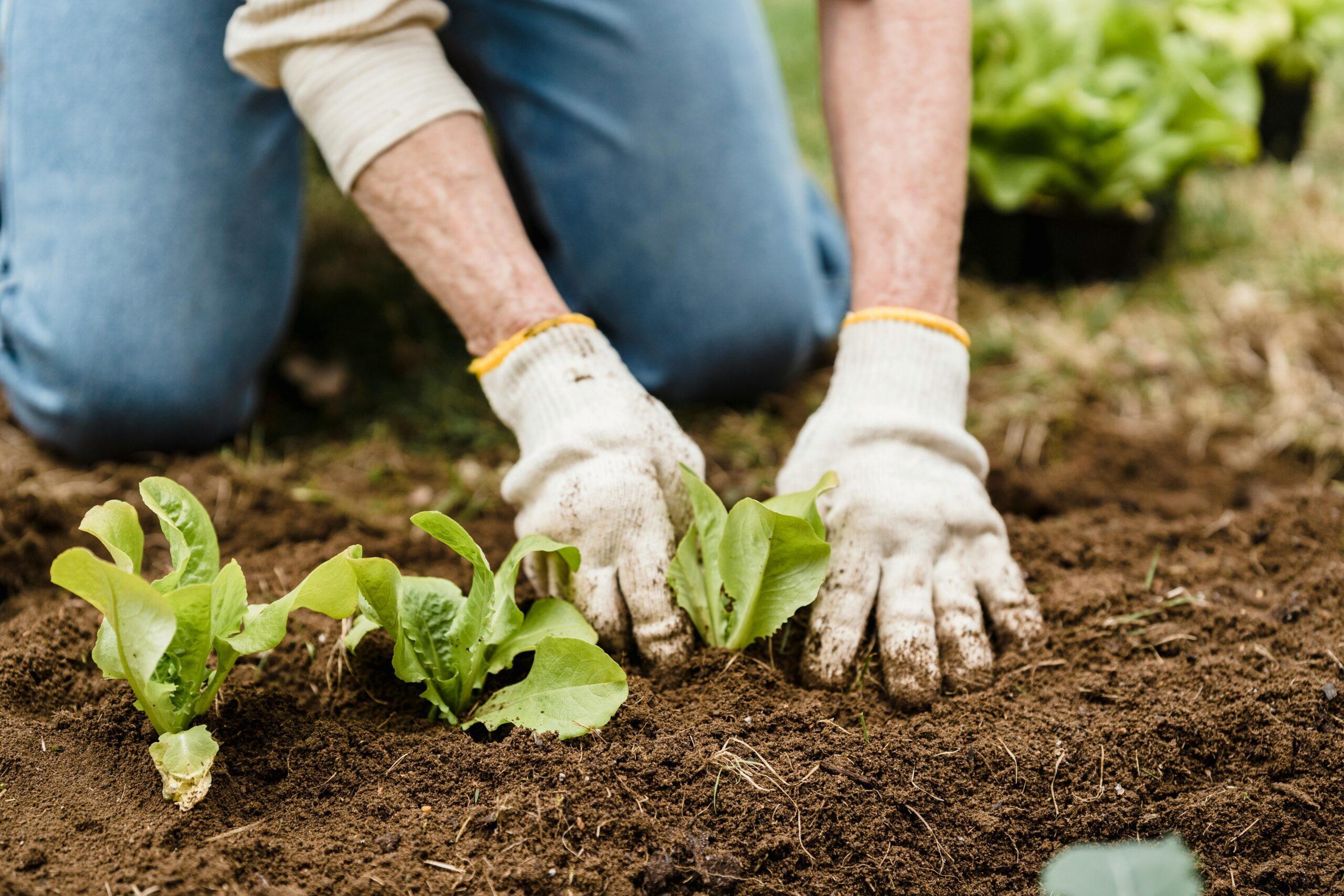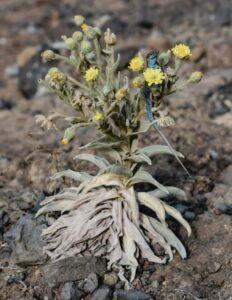Last Summer I planted our raised box garden with fresh soil that we purchased. On the bag it stated that it was specifically for gardens so obviously it was chosen with confidence along with some sheep manure to enrich it.
I also purchased new seeds from our local, nationally known, seed store!
Great, it was going to be such a treat having fresh veggies to enjoy out in the yard to pick!
Once the frost warning was gone, not till mid-June in our climate, I planted the seeds with great expectation. I was not disappointed, the seeds sprouted quickly and within no time the little seedlings were a couple of inches high. 🙂 I faithfully watered the garden but to my dismay, these little seedlings grew no more; all the seedlings except the yellow beans were stunted- stuck at 2 inches high – and I did not know what the problem was!
The harvest from the garden beds was dismal and I realized that the time and money spent on this project far outweighed the savings I had hoped to achieve in addition to the enjoyment of the fresh veggies. All my garden beds produced was a very small crop of yellow beans.
The issue was definitely not the seeds I used – it was the soil. I will have to test the soil to find out what is missing.
What does this story have to do with the topic of my post?
It relates well to the story in Mark 4:3-20 which tells the Parable of the Farmer Scattering Seed. In this parable Jesus tells a story about a farmer who scatters seed and that the seed falls on various kinds of soil.
- Some seed fell on the footpath where the soil would be hard packed; the seed lay on top of the path and the birds quickly ate it.
- Some seed fell on shallow soil with solid underlying rock. The seed sprouted quickly but because the soil was shallow its roots were not deep so the plant soon died under the hot sun.
- Some seed fell among thorny soil and the thorns choked out the tender plants so they did not produce.
- Some seed fell on fertile soil and it sprouted, grew and produced a very large crop!
The Disciples and others who were gathered around were not understanding what this parable meant so they asked Jesus to explain. This is what He taught them:
The Seed in the parable is the word of God.
The farmer plants the seed – the word of God.
Soils where the seed falls:
- The footpath represents the hearts of those who hear the message but Satan quickly takes it away.
- The rocky soil represents those who hear the message and immediately receive it with joy but since they don’t have deep roots, they don’t last long. They fall away as soon as they have problems or are persecuted for believing God’s word.
- The thorny soil represents those who hear God’s word but all too quickly the message is crowded out by the worries of this life, the lure of wealth and the desire for other things , so no fruit is produced.
- The fertile, good soil represents those who hear and accept God’s word and produce a harvest of thirty, sixty, or even a hundred times as much as had been planted!
I am sure each one of us can identify with these types of heart soils at different times in our lives.
How can we keep our soil – our hearts – fertile so that we are producing fruit for God’s kingdom?
We have to tend the soil of our heart.
- Dig Into God’s Word Daily! We need to dig into
 God’s word, be spending time in it daily- why? – God speaks to us through it. As we read and meditate, we search our heart to see if it is growing hard like a footpath where seed does not grow. As we read God’s word, we allow it to speak into us, to penetrate into our minds, which will then direct our thoughts, our actions.
God’s word, be spending time in it daily- why? – God speaks to us through it. As we read and meditate, we search our heart to see if it is growing hard like a footpath where seed does not grow. As we read God’s word, we allow it to speak into us, to penetrate into our minds, which will then direct our thoughts, our actions.
- Harrow the rocks out of your heart! Once again, it’s time in God’s word that grows and deepens our faith.
 We build our trust in the Lord and His promises as we see how He has provided for His followers in scripture. We too can record what God is teaching us and how He has provided for us, answered prayer for us. In difficult times, we can read back through these times that we saw God was faithful and has promised to be faithful. This will help us to persevere and continue on through whatever trials come our way.
We build our trust in the Lord and His promises as we see how He has provided for His followers in scripture. We too can record what God is teaching us and how He has provided for us, answered prayer for us. In difficult times, we can read back through these times that we saw God was faithful and has promised to be faithful. This will help us to persevere and continue on through whatever trials come our way.
- Yank those thorns from your heart! Yes, this sounds painful
 but so necessary for producing fruit. We get too busy living life, focusing on many things that are not that important in the eternal view. Time with God and living for God has little interest or priority. I think we all struggle with thorns, the thorns of worries, anxiety, lure of wealth, better jobs, bigger homes, more vacations….you name it. We are continually assaulted by the media enticing us to want more than we have. We are to live here as temporary citizens, camping out, just waiting for our citizenship in Heaven. We have all heard the true statement: “You can’t take anything with you when you go.” We came into the world with nothing and will leave with nothing except for what we send ahead of us to Heaven, where our treasures will not be destroyed.
but so necessary for producing fruit. We get too busy living life, focusing on many things that are not that important in the eternal view. Time with God and living for God has little interest or priority. I think we all struggle with thorns, the thorns of worries, anxiety, lure of wealth, better jobs, bigger homes, more vacations….you name it. We are continually assaulted by the media enticing us to want more than we have. We are to live here as temporary citizens, camping out, just waiting for our citizenship in Heaven. We have all heard the true statement: “You can’t take anything with you when you go.” We came into the world with nothing and will leave with nothing except for what we send ahead of us to Heaven, where our treasures will not be destroyed.
- Harvest the fruit of your faithfulness! Just as a garden
 does not flourish on its own, our relationship with our triune God must be tended carefully and faithfully. Our faith should be continuously fed and lived out in our daily lives using the gifts that God bestows on His followers for producing fruit in our lives and the lives of others.
does not flourish on its own, our relationship with our triune God must be tended carefully and faithfully. Our faith should be continuously fed and lived out in our daily lives using the gifts that God bestows on His followers for producing fruit in our lives and the lives of others.
I want my heart to be fertile soil that God can use to honour Him and that produces fruit in my life that points others to Jesus.
I want the fruit of the Spirit to be living and active in my life. Galatians 5: 22,23
I want Jesus to be able to say to me when I cross over to the other side:
‘Well done, good and faithful servant! You have been faithful with a few things; I will put you in charge of many things. Come and share your master’s happiness!’ Matthew 25:23
These desires require of us to cultivate the soil of our heart regularly….this I strive to do -though I do it so imperfectly.
What is it that your heart desires?
“The visionary who is serving God ceases to live for personal ambitions, but rather for God’s ambitions.” ~ George Barna

 God’s word, be spending time in it daily- why? – God speaks to us through it. As we read and meditate, we search our heart to see if it is growing hard like a footpath where seed does not grow. As we read God’s word, we allow it to speak into us, to penetrate into our minds, which will then direct our thoughts, our actions.
God’s word, be spending time in it daily- why? – God speaks to us through it. As we read and meditate, we search our heart to see if it is growing hard like a footpath where seed does not grow. As we read God’s word, we allow it to speak into us, to penetrate into our minds, which will then direct our thoughts, our actions.  We build our trust in the Lord and His promises as we see how He has provided for His followers in scripture. We too can record what God is teaching us and how He has provided for us, answered prayer for us. In difficult times, we can read back through these times that we saw God was faithful and has promised to be faithful. This will help us to persevere and continue on through whatever trials come our way.
We build our trust in the Lord and His promises as we see how He has provided for His followers in scripture. We too can record what God is teaching us and how He has provided for us, answered prayer for us. In difficult times, we can read back through these times that we saw God was faithful and has promised to be faithful. This will help us to persevere and continue on through whatever trials come our way.  but so necessary for producing fruit. We get too busy living life, focusing on many things that are not that important in the eternal view. Time with God and living for God has little interest or priority. I think we all struggle with thorns, the thorns of worries, anxiety, lure of wealth, better jobs, bigger homes, more vacations….you name it. We are continually assaulted by the media enticing us to want more than we have. We are to live here as temporary citizens, camping out, just waiting for our citizenship in Heaven. We have all heard the true statement: “You can’t take anything with you when you go.” We came into the world with nothing and will leave with nothing except for what we send ahead of us to Heaven, where our treasures will not be destroyed.
but so necessary for producing fruit. We get too busy living life, focusing on many things that are not that important in the eternal view. Time with God and living for God has little interest or priority. I think we all struggle with thorns, the thorns of worries, anxiety, lure of wealth, better jobs, bigger homes, more vacations….you name it. We are continually assaulted by the media enticing us to want more than we have. We are to live here as temporary citizens, camping out, just waiting for our citizenship in Heaven. We have all heard the true statement: “You can’t take anything with you when you go.” We came into the world with nothing and will leave with nothing except for what we send ahead of us to Heaven, where our treasures will not be destroyed. does not flourish on its own, our relationship with our triune God must be tended carefully and faithfully. Our faith should be continuously fed and lived out in our daily lives using the gifts that God bestows on His followers for producing fruit in our lives and the lives of others.
does not flourish on its own, our relationship with our triune God must be tended carefully and faithfully. Our faith should be continuously fed and lived out in our daily lives using the gifts that God bestows on His followers for producing fruit in our lives and the lives of others.
Very true Lorna, love your perspective because it sounds straight from the heart ❤️
Clear,concise and easy to read. A great reminder as illustrated to keep in the Word.